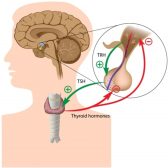Definition
noun
A speciation in which new species evolve in a sub-population that colonized a new habitat or niche within the same geographical area of the ancestral species, and experience genetic drift.
Supplement
Similar to allopatric speciation, peripatric speciation involves populations being geographically separated and prevented from exchanging genes. It differs from the allopatric speciation in a way that the population separating from the main population involves a smaller unit.
An example of this is the London Underground mosquito, a variant of the mosquito Culex pipiens, which entered in the London Undgerground in 19th century. Evidence for its speciation includes genetic divergence, behavioural differences, and difficulty in mating.
Word origin: Greek, from peri, around, near + Greek patrā, fatherland.
Compare: allopatric speciation, parapatric speciation, sympatric speciation.
See also: speciation, genetic isolation.
Dictionary > Peripatric speciation
You will also like...

Gene Action – Operon Hypothesis
Learn how the way genes control and determine every aspect of the body. This lesson uses lac operon as an example. ..
..

Human Perception – Neurology
This tutorial investigates perception as two people can interpret the same thing differently. Know more about human perc..

Population Growth and Survivorship
This lesson looks at population attributes, regulation, and growth. It also covers population genetics, particularly gen..

Plant Tissues
Plant organs are comprised of tissues working together for a common function. The different types of plant tissues are m..

Hormone Production
Hormones are chemical messengers produced by specialized glands and they were produced by switching on the genes designe..

Plant Metabolism
Plants are responsible for incredible feats of molecular transformation. Plant processes, such as photosynthesis, photop..

